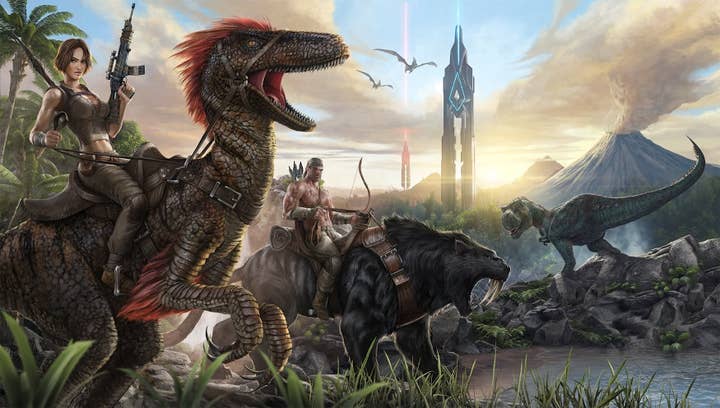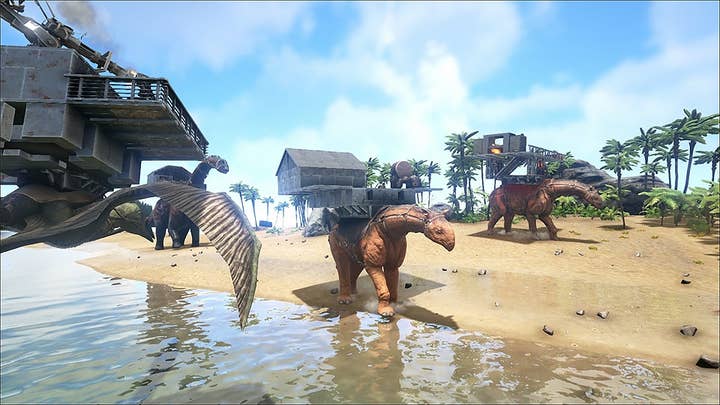Don't think of Early Access as a funding solution - Studio Wildcard
Ark: Survival Evolved dev says games in pre-release programs should be almost finished but in need of feedback
Ark: Survival Evolved is a perfect example of a game launched into Early Access generating the funds needed to finish the game. With more than 2.5 million units sold on PC since its June launch and expansion to Xbox One's Game Preview program earlier this month, Ark is footing the bill for its own development at this point. However, that was never the intention of the game's developer, Studio Wildcard.
Speaking with GamesIndustry.biz last week, Studio Wildcard co-creative director and co-founder Jesse Rapczak said the developers chose Early Access not for the funding possibilities, but for the opportunity to collect massive amounts of feedback during development.
"For us, Early Access is not something that should be taken lightly. It should be considered a final release in the sense that you're on a path to finishing the game and you're going to get it out there."
"It can really provide a way for a developer to put out a game that is relatively ready to be in a state of iteration, to improve that game and be confident that when the game's finished, it'll be something the players love and have a lot of feedback in creating," Rapczak said. "You're not waiting until launch to find out problems you might have with your design or balancing or things like that. By the time we hit our launch across all platforms, we feel like the game is really going to have been put through its paces."
While the game's Early Access sales have certainly padded Studio Wildcard's coffers, Rapczak clearly believes the program should be thought of as a feedback solution more than a funding solution.
"It can be a way to generate revenue for your title while you're working on it, but I would not advise anybody think of it like that," Rapczak said. "For us, Early Access is not something that should be taken lightly. It should be considered a final release in the sense that you're on a path to finishing the game and you're going to get it out there. Thinking of Early Access like a funding source introduces a sense of risk. Although it's on the disclaimer that this game might not ship, etc., that's not something this model needs in the consumer perspective. Certainly, if many games look at it that way and lots of games don't ship or fail to come to market, this model is going to go away and developers like us won't be able to benefit from it being an actual, legitimate phase of development."

From the moment Ark: Survival Evolved was announced in May, it seemed to be a surefire hit. The original announcement trailer showcased the game's open world, crafting systems, survival-focused gameplay, and perhaps most importantly, dinosaurs. The trailer dropped as hype for the summer blockbuster Jurassic World started building, and the game itself launched on Early Access right after the film's opening weekend.
"We had an explosion of purchases," Rapczak said. "We blew through all our expectations on a Thursday. We had to scramble to get up servers and make the game run on open hardware. It was a lot of work. I can't say there was a point in time where there wasn't interest in Ark. I think we just hit on a really lucky and unique game concept that nobody was really doing in the marketplace. It was just timing."
That fortuitous timing will be hard for others to reproduce, but Rapczak said he wouldn't be surprised to see certain elements of Ark become a lot more prominent in games over the next couple years.
"Everybody's always excited about dinosaurs," Rapczak said. "I think dinosaurs are a culturally agnostic interest. Everybody likes dinosaurs across the world. It's not like zombies or something where some cultures don't have anything to do with them."
The overnight nature of Ark's success is appropriate given the relatively overnight nature of its development. Rapczak said development on the game started barely over a year ago as a collaboration between four different studios around the world. Seattle-based Wildcard is working with Egyptian developer Instinct Games, Colombian outfit Efecto Studios, and Virtual Basement, a team itself spread between the US, Australia, and Portugal. Rapczak is no stranger to remote collaboration, having previously run Indian outsourcing studio Exigent, and he said all of the developers have previous experience on distributed development projects.

"Working remotely is not really a barrier these days," Rapczak said. "There are only a few things that are really better done together in the same spot, and that's shrinking as well with modern technology."
In the long run, there may not be a place in the industry for the traditional model of having an entire development team working out of the same building, at least not with mid-size teams.
"I don't think it's sustainable," Rapczak said. "If you look at the industry and the amount of projects that don't go as planned financially and the studios have to downsize or close all together, all of that is a factor of too much overhead in the cost and not enough flexibility to scale the team up and down... I think [remote collaboration] is the future for medium-sized teams for sure because it really allows a lot more flexibility with not over-investing yourself before you're ready to move forward on a project or on your next project."
That sort of adaptation is a recurring theme for Studio Wildcard. With the market increasingly interested in eSports, the developer is exploring ways to combine its breakthrough hit with the latest trend. Right now Studio Wildcard is working to turn a popular Hunger Games-style competitive mod for Ark called Survival of the Fittest into a stand-alone game. Beyond implementing a number of eSports-friendly features absent from the standard Ark experience, Survival of the Fittest will also adapt its monetization model to the current market. Rapczak wouldn't say exactly what that will look like yet, but it will be different from Ark's.

